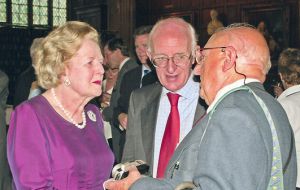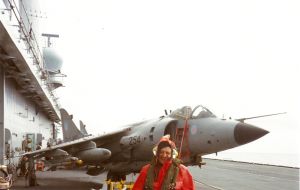MercoPress. South Atlantic News Agency
The Iron Lady and I!
 Harold Briley (R) interviewing Margaret Thatcher in London as a Falklands’ anniversary reunion with David Tatham, a former governor of the Islands
Harold Briley (R) interviewing Margaret Thatcher in London as a Falklands’ anniversary reunion with David Tatham, a former governor of the Islands Mercopress correspondent Harold Briley knew Margaret Thatcher well, here reminiscing on fifty years of reporting her activities for half a century as a BBC Political, Latin America. Defence and East Europe Correspondent.
I first encountered Margaret Thatcher as a new Member of Parliament in 1959 when I was among the few people in the House of Commons, listening to her maiden speech which, ironically, in view of her later animosity towards the media, advocated wider access for the Press to report local authority meetings.
Our paths were to cross many times over the next 50 years as a political and defence correspondent, covering the Cold War in Eastern Europe and as Latin America Correspondent in Buenos Aires during the Argentine invasion, when my World Service broadcast of the invasion was a world scoop.
I accompanied her on her tenth anniversary visit to the Falklands in 1992 and interviewed her in the RAF flight south. She told me that “Despite being the Iron Lady, I am a compassionate woman. These were the most difficult years of my life and the worst decision I ever had to make was to send men to war knowing some of them would be killed”.
In Buenos Aires where I was on the day of the invasion, the Argentines were astonished by her response. The Foreign Minister, Costa Mendez, told me they never expected her to react as she did. “The war was a mistake”, he said. “We wanted only to force definitive talks for transfer of sovereignty”.
She had no idea where the Falklands were. Nor did Defence Secretary John Nott. They had to consult the Times Atlas to find out.
She famously said “The Lady is not for turning”. But she turned completely on her policy on the Falklands which, for years, for successive Conservative and Labour governments had been to transfer sovereignty through negotiations, which one of her favourite Ministers, Nicholas Ridley, almost brought off in clandestine talks with Argentina. But she made amends for this with her brave and risky decision to send a task force and her steely unwavering determination throughout the conflict. South Atlantic veterans told me they respected her for this even though she sent them into danger.
She claimed the invasion came as a complete surprise but in fact she had been warned in intelligence reports warnings that Argentina might resort to military force if they were frustrated by lack of progress on sovereignty talks.
The invasion left the British Government dismayed and in disarray. The pessimistic Defence Secretary, John Nott, advised her that the Islands could not be recaptured. But this was contradicted by the head of the Royal Navy, Sir Henry Leach, with experience of the Second World War. In full admiral’s uniform, he was the hero of the hour when he told her he could immediately despatch a task force. “Don’t pussyfoot about”, he told her. “Send every ship we have. What is the use of having the Royal Navy if you don’t use it”?
Fortunately he still had some of the vital aircraft carriers and the Endurance which John Nott, with Margaret Thatcher’s support, was in the process of getting rid of. Emboldened by the Admiral’s advice, her resolve hardened and she made a Churchillian speech to Parliament saying the repressive Argentine military dictators could not prevail. The Islands would be liberated. This brought about the downfall of the dictatorship, the very scenario they had tried to avoid by launching the invasion. It ended seven years of repression in Argentina in which the military abducted, tortured and killed thousands of their own people. Restoration of democracy in Argentina, thanks to the British victory, had a domino effect paving the way for the many military dictatorships in Latin America to progress to democratic government.
Margaret Thatcher’s influence on the whole of Latin America is often overlooked. Many present day leaders have expressed sadness at her death, and paid tribute to her as a courageous leader -- but in Argentina there is still bitterness over the sinking of the cruiser Belgrano with the loss of more than 360 lives.
This was the most controversial act of the war for which Argentina tried to have her prosecuted internationally as a “war criminal”. But even the Argentine admirals I interviewed told me it was “a legitimate act of war”. They confirmed that the Belgrano, a heavily armed cruiser, was part of a pincer movement to attack the British task force from the south and the north where another battle group led by the aircraft carrier, Veinticinco de Mayo, whose aircraft were about to take off to launch a fatal attack on the British aircraft carriers when the wind dropped preventing them from taking off from the carrier deck.
I interviewed both the captain of the submarine, Conqueror, which fired the fatal torpedoes and the captain of the Belgrano after his rescue so I heard both sides. Though the cruiser was heading away from the British-imposed exclusion zone around the Islands which intensified the controversy, the British Government had given prior warning that Argentine ships and aircraft would be attacked whether in the exclusion zone or not.
In Buenos Aires, I was frequently asked by the public whether the British intended to fight and I told them they should not under-estimate Margaret Thatcher’s strength of character and determination or the capability of the British armed forces as I had much experience of both. But when they expressed fears that Prime Minister Thatcher might order a nuclear attack on the Argentine mainland, I was able to assure them the British had no intention of using nuclear weapons.
Margaret Thatcher was caricatured by the Argentine media as a pirate complete with skull and crossbones headgear and a black eye patch. But even some of the military dictators in other Latin American countries at the time told me they admired her for her toughness as “the Iron Lady”.
I was partly responsible for her being called the Iron Lady by the Soviet Union, reacting to a despatch I wrote about a speech she made attacking the Soviet Union. She sent me the speech two hours in advance, so it could be translated and transmitted by the BBC Russian Service so the Soviet Union heard it first from the BBC even as she was speaking. The Russians reacted by calling her the “Iron Lady”. She was amused when I told her how this came about, but revelled for ever thereafter in the image it gave her, enhancing her reputation as a tough leader.
At the height of the Cold War, I interviewed her as Opposition Leader just before she ventured on her first visit to East Europe so I was not surprised by her close partnership with President Ronald Reagan in confronting Communism and the Soviet-dominated Warsaw Pact.
Harold Briley, London





Top Comments
Disclaimer & comment rules-

-

-

Read all commentsThank you Harold.
Apr 12th, 2013 - 02:02 am 0Dear Harold, Thatcher is not only about the Malvinas Islands. She is much more but it would seem you'd rather no touch the following topics:
Apr 12th, 2013 - 02:11 am 01. She symbolises the lack of generosity and kindheartedness of a certain brand of entrepreneurial Protestantism.
2. She symbolises cheap and dangerous patriotism at the rotting end of empire.
3. She symbolises the victory of ill gotten gain over profits from hard sustained labour.
4. She symbolises the destruction, by fair means and foul (but mainly foul) of workers rights to defend themselves in the workplace.
5. She symbolises the spread, like a virus, of the destructive ideology of the Chicago school through all the establishment's forums from Davos to G8.
6. She symbolises the military industrial complex and Mutually Assured Destruction, with Reagan taking us to the brink of war with a first strike policy she supported.
7. She symbolises the loss of Britain's position as a leading industrial power.
8. She symbolises the way British people became defenseless against exploitation, with millions of people in the British living increasingly off shitty low paid part time jobs.
9. She symbolises the victory of identity politics over social justice. A woman presiding over the impoverishment and oppression of a whole nation.
10. She symbolises the loss of national sovereignty to the United States, with US listening stations and military bases dotting the archipelago.
11. She symbolises the cultivation of the council house buyers, the I am alright jack fuck you brand of Britishness and the end of affordable council housing.
12. For Thatcher there was no such thing as society because she was busy her best to destroy it. Especially in the North of England.
13. Thatcher symbolises the end of One Nation Tory-ism and the beginning of an even more horribly divided set of islands.
14. Thatcher symbolises the victory of the watery dark selfish mean spirit of many British people over their tolerant generous kind better selves.
Marvellous piece from the venerable Harold Brierly. Deserves more thanks. Fair and balanced observations, without rancor, from a commentator who was in the rarest of positions: - astride the UK, the islands and Argentina. Having read this potted history of the conflict, I would like to read his thoughts on the direction of Anglo-Argentinian relations in the future.
Apr 12th, 2013 - 02:26 am 0Commenting for this story is now closed.
If you have a Facebook account, become a fan and comment on our Facebook Page!